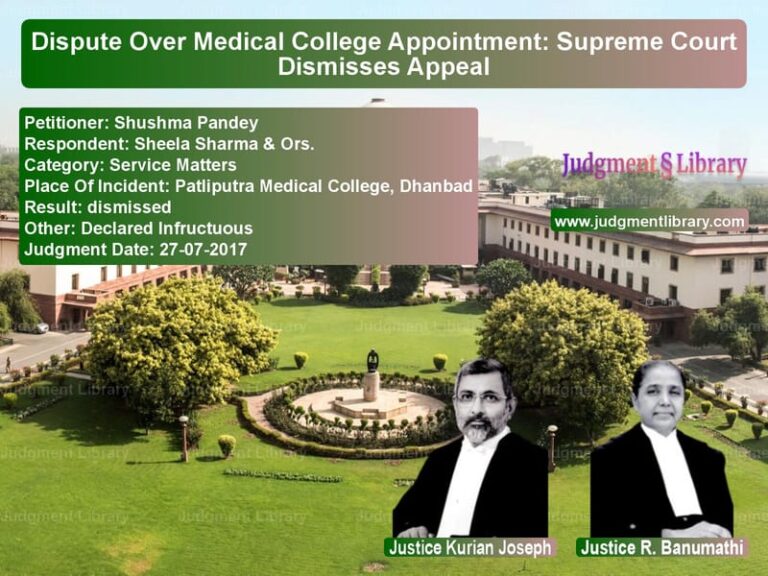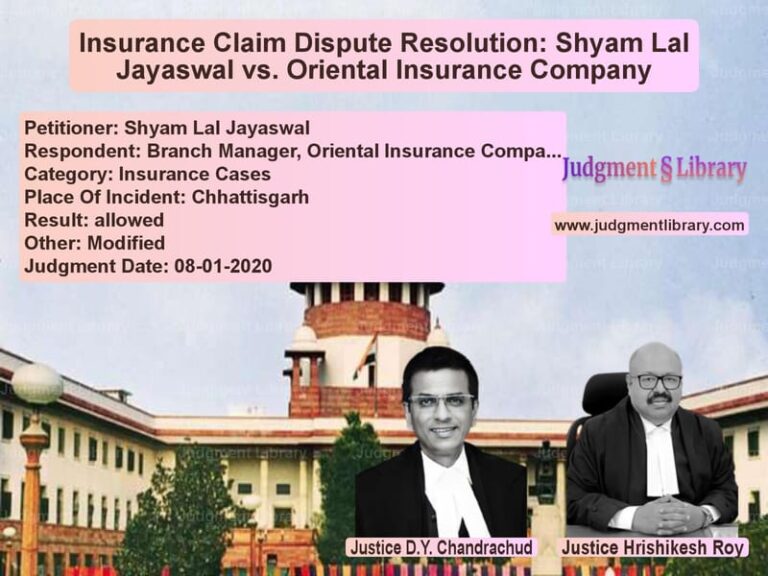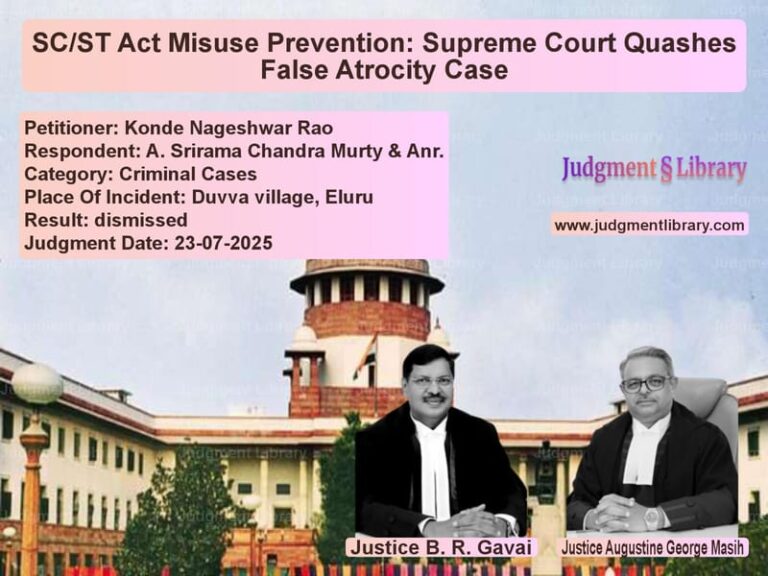Supreme Court Upholds Taxation of Maize Starch Under Tamil Nadu Sales Tax Act
The Supreme Court of India recently ruled in Santhosh Maize & Industries Limited vs. The State of Tamil Nadu, dismissing the appeal against the taxation of maize starch under the Tamil Nadu General Sales Tax Act, 1959. The case revolved around whether maize starch qualified for exemption as a millet product or was taxable as a starch under the amended entries of the Act.
Background of the Case
The appellant, Santhosh Maize & Industries Limited, was engaged in the business of maize starch since 1975 and was registered under the Tamil Nadu General Sales Tax Act, 1959. The dispute centered around the classification of maize starch—whether it was covered under the exemption notification granted to millet products or was taxable as a starch under the amended provisions of the Act.
The relevant legislative developments included:
- A notification in 1970 exempted products of millets (rice, flour, brokens, and bran of various millets, including maize) from sales tax.
- In 1993, the Tamil Nadu government amended the Act, adding ‘sago and starch of any kind’ to the taxable list at 5% under Entry 53 of Schedule I.
- Further amendments in 1994 incorporated the exemption into the Schedule, listing ‘products of millets’ in Entry 8 of Part B of Schedule III but omitting the word ‘like’ from the notification.
- In 1996, the taxable entry was moved to Entry 61 and taxed at 4%.
- A 1998 clarification from the Commissioner of Commercial Taxes stated that maize starch was taxable, reversing previous positions.
The appellant challenged this new interpretation and sought exemption for maize starch.
Arguments by the Appellant
The appellant’s counsel argued:
- Maize starch is derived from maize, which is a millet product, and should therefore be covered under the exemption for millet products.
- The omission of the word ‘like’ in the 1994 amendment should not change the interpretation of the exemption entry.
- Precedents such as State of Tamil Nadu vs. Lakshmi Starch upheld exemption for maize starch.
- The retrospective application of the 1998 clarification was invalid as it amounted to a change in tax policy.
Arguments by the Respondents (State of Tamil Nadu)
The Tamil Nadu government countered:
- Maize starch is a processed product and not a direct product of millet, thus not covered under the exemption.
- The entry for ‘sago and starch of any kind’ clearly includes maize starch under the taxable category.
- The omission of ‘like’ in the exemption entry was intentional, limiting the exemption strictly to products listed.
- The 1998 clarification merely reiterated the existing legal position and did not amount to a retrospective change.
Supreme Court’s Observations and Ruling
The Supreme Court, comprising Justices S. Ravindra Bhat and Dipankar Datta, upheld the validity of taxing maize starch.
1. Exemption for Millets Does Not Cover Maize Starch
“The omission of the word ‘like’ in the exemption entry signifies legislative intent to restrict the exemption to the specific items mentioned.”
2. Maize Starch Is a Processed Product
“Maize starch, unlike flour or bran, undergoes significant processing and is distinct from raw maize or its simple derivatives.”
3. Taxation Entry Includes Starch of Any Kind
“The term ‘starch of any kind’ in Entry 61 is broad enough to include maize starch, making it taxable at 4%.”
4. Retrospective Clarifications Are Valid
“The Commissioner’s 1998 circular did not alter the legal position but merely clarified it, applying to past transactions as per the law.”
Final Judgment
- The Supreme Court dismissed the appeals and upheld the taxability of maize starch.
- The Commissioner’s 1998 clarification was deemed valid.
- The appellant was directed to pay the outstanding tax liabilities.
Implications of the Judgment
- Reaffirms that processed products are treated differently from raw agricultural products for tax purposes.
- Strengthens the principle that statutory exemptions must be strictly interpreted.
- Clarifies that official tax clarifications can apply retrospectively if they do not introduce new levies but clarify existing laws.
This judgment reinforces the importance of precise legislative drafting and statutory interpretation in tax matters.
Petitioner Name: Santhosh Maize & Industries Limited.Respondent Name: The State of Tamil Nadu & Anr..Judgment By: Justice S. Ravindra Bhat, Justice Dipankar Datta.Place Of Incident: Tamil Nadu.Judgment Date: 03-07-2023.
Don’t miss out on the full details! Download the complete judgment in PDF format below and gain valuable insights instantly!
Download Judgment: santhosh-maize-&-ind-vs-the-state-of-tamil-n-supreme-court-of-india-judgment-dated-03-07-2023.pdf
Directly Download Judgment: Directly download this Judgment
See all petitions in GST Law
See all petitions in Tax Evasion Cases
See all petitions in Tax Refund Disputes
See all petitions in Judgment by S Ravindra Bhat
See all petitions in Judgment by Dipankar Datta
See all petitions in dismissed
See all petitions in Declared Infructuous
See all petitions in supreme court of India judgments July 2023
See all petitions in 2023 judgments
See all posts in Taxation and Financial Cases Category
See all allowed petitions in Taxation and Financial Cases Category
See all Dismissed petitions in Taxation and Financial Cases Category
See all partially allowed petitions in Taxation and Financial Cases Category







